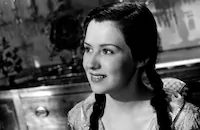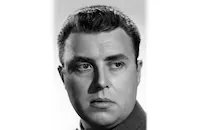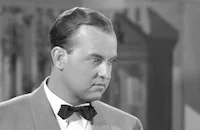The Great Bank Robbery

Brief Synopsis
Cast & Crew
Hy Averback
Zero Mostel
Kim Novak
Clint Walker
Claude Akins
Akim Tamiroff
Film Details
Technical Specs

Synopsis
Slade, a gunfighter, robs a Texas train of a large shipment of gold and deposits it in a bank in the town of Friendly. The vault's contents are being sought by two rival gangs. Mexican bandit Papa Pedro and his men make two fumbling attempts to rob the vault, first by rushing the bank only to be chased away by a blast of gunfire, and then by attempting to break down the door with a battering ram. The second gang is led by the Rev. Pious Blue, who has established himself as the town's preacher; his associates, who include the beautiful Lyda Kabanov, plan to tunnel into the bank and dynamite the wall on the Fourth of July, when an explosion will go unnoticed. Texas Ranger Ben Quick, with his band of five Chinese secret service agents, is also trying to tunnel into the bank, but his mission is to obtain evidence that will incriminate Kincaid, the town's crooked mayor and owner of the bank. On the Fourth of July, Reverend Blue's gang reaches the vault first. While robbing the vault they accidentally discover the evidence against Kincaid; the gang is then chased by Quick until they come to a giant balloon waiting to take them to safety. The reverend miscalculates the weight of the gold, however, and the balloon is unable to rise. To lighten the load, Lyda jumps out, permitting the reverend to escape, and she remains with her lover, Quick; and the Texas Ranger gets the evidence needed to convict Kincaid.

Director

Hy Averback
Cast

Zero Mostel

Kim Novak

Clint Walker

Claude Akins

Akim Tamiroff
Larry Storch
John Anderson

Sam Jaffe
Mako

Elisha Cook Jr.

Ruth Warrick
John Fiedler
John Larch

Peter Whitney
Norman Alden

Grady Sutton
William Zuckert

Bob Steele
Ben Aliza
Mickey Simpson
Byron Keith
Kenny Endoso
Roy Ogata
George Sasaki
Yoneo Iguchi
Hiroshi Hissamuri
The Robert Mitchell Boychoir
Crew
Paul Baxley
William Peter Blatty
Sonny Burke
Sammy Cahn
Ben Chapman
Jack Cunningham
Ken Darby
Mark Davis
Richard Freed
Fred Gammon
Gil Grau
Al Greenway
Everett A. Hughes
Howard Kazanjian
Fred Koenekamp
William L. Kuehl
Moss Mabry
Gene Milford
Miriam Nelson
Jack Poplin
Don Record
Jean Burt Reilly
Nelson Riddle
Malcolm Stuart
Malcolm Stuart
Tyler Camera Systems
James Van Heusen
Ralph Webb
Jack Willoughby
Paul Edward Yost

Film Details
Technical Specs

Articles
The Great Bank Robbery

The Great Bank Robbery
Ruth Warrick (1915-2005) - Ruth Warrick, (1915-2005)
She was born on June 29, 1915 in St. Joseph, Missouri. After attaining a degree in theatre from the University of Kansas City, she left for New York, where in 1938, she joined the Mercury Theater troupe, headed by a young artist on the rise by the name of Orson Welles. When Welles prepared to film Citizen Kane (1941) he took several players from his Mercury Theater (Joseph Cotten, Everett Sloan, Agnes Moorehead) and of course, Ruth Warrick. She made her film debut in Welles' cinematic epic as Emily Norton Kane. Indeed, to many film buffs, Warrick's icy charms are indispensable to the celebrated montage sequence opposite Welles at the breakfast table; particularly when he broaches the subject of her husband's infidelity:
Emily Kane: Charles, people will think...
Charles Kane: What I tell them to think!
Warrick received fine reviews for her performance, and she had good roles in her next two films The Corsican Brothers (1941), with Douglas Fairbanks Jr., and Journey Into Fear (1942), opposite Joseph Cotton. Sadly, Hollywood, not knowing what to do with a well-trained, mature actress like Warrick, began to cast her into routine, forgettable fare: Mr. Winkle Goes to War (1944), China Sky (1945), and Swell Guy (1946). Disney's Song of the South (1947), was a box-office hit, and was her best film in a while, but overall, the material she received over the next few years, simply wasn't worthy of her talents.
Things turned around for her in the mid-50s, when Warrick discovered the medium of television. She had regular roles on The Guiding Light (1953-54), As the World Turns (1956-60), Father of the Bride (1960-61), and was unforgettable as the sinister housekeeper, Hannah Cord, in Peyton Place (1965-67). Yet it was her 35-year run in the role of Phoebe Wallingford in All My Children (1970-2005), that Warrick achieved her greatest triumph. As the rich, intrusive matriarch of the fictitious, affluent town known as Pine Valley, Warrick found a role that could be at once gloriously hammy and quietly conniving - qualities that highlighted her renown versatility as an actress. To honor her contribution to television, Warrick received a lifetime achievement award from the Daytime Emmys last December. She is survived by three children, a grandson, and six great-grandchildren.
by Michael T. Toole
Ruth Warrick (1915-2005) - Ruth Warrick, (1915-2005)
Quotes
Trivia
Miscellaneous Notes
Released in United States Summer July 1969
Released in United States Summer July 1969














